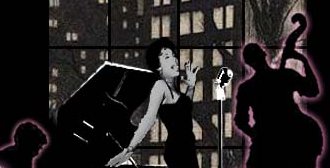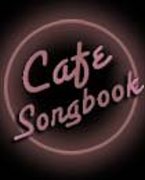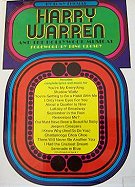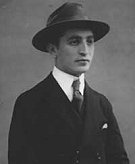Welcome toCafe SongbookInternet Home of the |
 |
 |
| Home || Songs || Songwriters || Performers || Articles and Blogs || Glossary || About Cafe Songbook || Contact/Submit Comment | |
| Search Tips: 1) Click "Find on This Page" button to activate page search box. 2) When searching for a name (e.g. a songwriter), enter last name only. 3) When searching for a song title on the catalog page, omit an initial "The" or "A". 4) more search tips. | |
| Portions of this page have not yet been completed. Thank you for your patience. | |||
My Heart Tells Me |
|||
Written: 1943 |
Music by: Harry Warren |
Words by: Mack Gordon |
Written for: Sweet Rosie O'Grady |
| Page Menu | |||
| Main Stage || Record/Video Cabinet || Reading Room || Posted Comments || Credits | |||
On the Main Stage at Cafe Songbook | |||
(Please complete or pause one video before starting another.) |
Joe Williams (vocal)
|
||
| Amazon | iTunes |
More Performances of "My Heart Tells Me"
in the Cafe Songbook Record/Video Cabinet
(Video credit )
Cafe Songbook Reading Room"My Heart Tells Me" |
|||||
| About the Movie Sweet Rosie O'Grady / Origins of the Song | |||||
|
When Harry Warren and Mack Gordon were assigned by Twentieth Century Fox to write the songs for Sweet Rosie O'Grady, they had to produce new songs to fit a past time and place, New York during the 1880s. Born Rosie O'Grady in Brooklyn, the character played by Betty Grable has achieved great success in London under the name of Madeleine Marlowe, both on the stage and in romance -- with a duke no less. She returns to New York, but her pose as a lady of refinement is exposed by Sam Magee (Robert Young), a regular guy reporter for the Police Gazette. This does not endear Magee to her and the plot is a device to show how their mutual animosity turns into love. As is the case with songs in so many movie musicals, "My Heart Tells Me" is introduced in Sweet Rosie O'Grady when one character shows the song to another as a means to getting it performed in a show. In this case, the composer of the song, Clark, (Phil Regan) comes to the home of Madeleine Marlowe, aka Rosie O'Grady (Betty Grable) to play and sing it for her in the hope that she will use it in her act. As the Hollywood fates would have it, Madeleine is in the bath when Clark arrives, so the sheet music is taken into her by a maid. Clark proceeds to play it on the piano and sing it to her from an adjoining room. Madeleine/Rosie likes it and asks him to play it again in her key. She proceeds to sing it from her bubble-filled tub, confirming the song's desirability -- and creating what some have called the film's most memorable scene. Later in the film, when Madeleine returns to Flugelman's Beer Garden where she is remembered as Rosie O'Grady from her earlier less highfalutin days, she grants everybody's wish that she sing a number by reprising "My Heart Tells Me." At this point she is beginning to fall for Sam MaGee despite her distrust of him; but she is also unsure of her heart, which tells her "this is just a fling." A contrary set of feelings are unmistakable when she returns to her table after singing the song on Flugelman's stage and sings it directly to him. Her heart may have told her that she "will cry again," but the look in her eye portends otherwise. Considerably more squabbling will ensue between the two of them, but by the end of the film it no longer matters what cautionary advice her heart has given her -- or whether her last name is Marlowe or O'Grady, because, as Sam tells her, her name will soon be Magee.
Harry Warren recalled that "Betty Grable was an easy performer to work with. 'I don't remember her ever objecting to a song or causing any problems.'" He noted, however, that over time their friendship cooled when she became a little remote. He rather generously forgave her behavior by explaining, "From what I could see of it, there wasn't anything easy about being a star" (Tony Thomas, Harry Warren and the Hollywood Musical |
||||
| back to top of page | |||||
| Critics Corner | |||||
 Thomas Hischak, The Tin Pan Alley Song Encyclopedia |
Thomas Hischak describes "My Heart Tells Me" as "an inquiring ballad" (p. 254). The singer asks questions of herself based on what her heart tells her, which is contrary to what he (and to a significant Degree she) desire. The questions begin in the seldom heard verse; "How am I to know if I am right or wrong?"; and continue in the refrain: "If I'm fool enough to see this ["fling"] through, would I be sorry if I do?" She can see the sense in her heart's advice to abandon this romance that will produce nothing but "sorrow and tears" because she knows that "lips that kiss like yours could lie again." Unlike her heart who is sure that nothing good will come from this romance, she has no easy answer to her inquiries. The song concludes with the question, "Should I believe my heart or you?" It is curious that the heart in this song is the stand-in for cautionary common sense rather than playing its more typical role as the seat of desire, which apparently resides elsewhere in her. |
||||
| back to top of page | |||||
| Lyrics Lounge | |||||
Click here to read the lyrics for "My Heart Tells Me" as sung by Frank Sinatra (who did not include the verse, which, as heard on the Tony Bennett recording from the album Cloud 7, goes as follows:
Click here to read Cafe Songbook lyrics policy. |
|||||
| back to top of page | |||||
Visitor CommentsSubmit comments on songs, songwriters, performers, etc.
Feel free to suggest an addition or correction. Please read our Comments Guidelines before making a submission. (Posting of comments is subject to the guidelines. Not all comments will be posted.) |
| To submit a comment, click here. |
| Posted Comments on "My Heart Tells Me": |
| back to top of page |
Credits("My Heart Tells Me" page) |
Credits for Videomakers of custom videos used on this page:
Borrowed material (text): The sources of all quoted and paraphrased text are cited. Such content is used under the rules of fair use to further the educational objectives of CafeSongbook.com. CafeSongbook.com makes no claims to rights of any kind in this content or the sources from which it comes.
Borrowed material (images): Images of CD, DVD, book and similar product covers are used courtesy of either Amazon.com
Any other images that appear on CafeSongbook.com pages are either in the public domain or appear through the specific permission of their owners. Such permission will be acknowledged in this space on the page where the image is used.
For further information on Cafe Songbook policies with regard to the above matters, see our "About Cafe Songbook" page (link at top and bottom of every page). |
This section is currently incomplete. The Cafe Songbook |
||||
|
Performer/Recording Index
(*indicates accompanying music-video)
|
||||
| back to top of page | ||||
1943
Notes: See also the album of Grable soundtrack recordings |
||||
| back to top of page | ||||
1943-4
Notes: "For fans of bandleader Glenn Miller, this two-disc collection is a gold mine. Recorded at the historic Abbey Road Studios in London shortly before Miller's untimely death in 1944, this music captures a period in world history that will never be forgotten. In the wake of the D-Day invasion in Europe, Miller was creating propaganda music to be broadcast over enemy lines. What better than hot jazz and dance music to distract the worn-out German soldiers?. |
||||
| back to top of page | ||||
1943
Notes: The recording of "My Heart Tells Me" by the Glen Gray Casa Loma Orchestra with vocal by Eugenie Baird (which can be found on the albums offered at both the Amazon and iTunes links above (as well as several other compilations) rose to number 1 on the charts November 27, 1943. It remained at #1 for five weeks and on the charts for 21 weeks, making it one of the biggest hits of 1943-44. The original 78rpm recording, Decca Records, record #18567, dated Oct. 1, 1943, had "My Heart Tells Me (Should I Believe My Heart?)" as the A side, and "My Shining Hour" (Harold Arlen - Johnny Mercer From 20th Century Fox picture The Sky's the Limit), also with vocal by Eugenie Baird, as the B side.
|
||||
| back to top of page | ||||
1943
Notes: Charlie Parker, Alto Sax; Efferge Ware, Guitar; "Little" Phil Phillips, Drums -- Recorded: Vic Damon Studio, Kansas City, Kansas, Autumn, 1943. Rhino's "Yardbird Suite" and Jazz Classics' "Legendary Dial Masters" make excellent introductions to Charlie Parker's best music, but this JSP set gives you much more wonderful music for approximately the same price. You get all of the Dial and Savoy masters from his greatest years, 1945-48 (compare this JSP price to Savoy's significantly more expensive 3CD compilation of the masters), plus the six key Parker/Gillespie tracks from early 1945 that are included on the Rhino, plus Sarah Vaughan backed by Parker/Gillespie on four tracks, including "Lover Man" and "Mean to Me" (from Amazon customer review). |
||||
| back to top of page | ||||
1958
Notes: This Nat King Cole track of "My Heart Tells Me (Should I Believe My Heart?)" is "from the 1958 Capitol release, The Very Thought Of You, arranged, and conducted by Gordon Jenkins. The album was released on CD by Capitol's Collectors Choice label." catman916 "Nat King Cole possessed one of the most accessible and appealing voices of any singer in the 1950s. This ballad-oriented set puts the emphasis completely on his voice (there is no piano playing or any hint of his jazz-oriented past) and features Cole accompanied by Gordon Jenkins' sweet arrangements for a string orchestra. Many other singers might find it difficult to overcome, much less uplift this type of accompaniment, but Cole's basic and honest delivery works quite well in this setting" (from iTunes review). (Ed's. Note" It is always fascinating to read reviews that don't like Gordon Jenkins arrangements try to say so in a nice way. If you want to listen to a Jazz inflected Nat King Cole Trio recording of "My Heart Tells Me" (c. 1945) with a female vocalist (currently unidentified by us) from a radio transcription, you can. It's available on a CD box set titled Rare Radio Transcriptions The Nat King Cole Trio at Amazon. Video: same track as on the album shown above. |
||||
| back to top of page | ||||
|
1955
Notes: "Released in 1955, when Tony Bennett was only 30 years old, Cloud 7 was the record he fought and earned the right to make. He'd already had a string of hits for the label and was regarded as a major talent. (In 1951 alone he charted seven times.) Bennett was looking to the then new long-playing 33-rpm format LP to bring a record to the public that showcased his voice in a more intimate, mood-setting environment . . . . Bennett surrounded himself with a smallish jazz group and recorded ten standards . . . . Cloud 7 is the album on which Bennett himself realized the full potential of his gift; the album elevated him from being a great pop singer to a bona fide artist. . . " (from iTunes review). --This is one of the few recordings that includes the
verse. 1962
Notes: "This two-CD set is recorded concert performance at its best. Originally recorded in 1962, Tony Bennett at Carnegie Hall is a testament to Bennett's live vocal ability. Backed by the Ralph Sharon Orchestra, Bennett moves far beyond his standard musical catalogue. Along with standards like "I Left My Heart in San Francisco" and "Just in Time," Bennett reached out to create great medleys such as "(I Like New York in June) How About You/April in Paris," that automatically become his as soon as they are performed. Forty-four tracks altogether, this latest printing of the concert is the first to cover the entire performance" (from iTunes review). |
||||
| back to top of page | ||||
1961
Notes: on the album Something Nice, recorded during two sessions in 1960-1961. "Jones is joined by two separate rhythm sections, and there is a guest appearance for tenor saxophonist Oliver Nelson (on "Easy Living"), two by vibraphonist Lem Winchester, and three from guitarist Wally Richardson." The album shown on the video, Etta Jones' Don't Go to Strangers |
||||
| back to top of page | ||||
1976
Notes: This is Susannah McCorkle's first solo album, released in 1976 in the UK where she was then based. She sings Warren standards with lyrics by various writing partners such as Al Dubin and Mack Gordon. The Music of Harry Warren did not get much attention on its initial release, but an American edition appeared in 1981, which has since been re-released (2008) on CD. In McCorkle's early work one can already hear her impressive voice taking on the qualities so familiar on subsequent albums but with a naive enthusiasm not much heard in the later work. By the time of her suicide in 2001, she had become a mainstay on the cabaret circuit in New York City, around the United States and abroad. Her affinity for jazz that stayed with her throughout her career is announced on this earliest album both through her singing and the company she chooses: pianist Keith Ingham, reed man Bruce Turner, bassist Len Skeat and drummer Johnny Richardson. (No music-video currently available) |
||||
| back to top of page | ||||
1993
Notes: The video is of a live solo peformance of a medley of two Warren songs ("My Heart Tells Me" and "This Heart of Mine.") at the ballroom of the Edgewater Hotel in Madison, Wisconsin on August 29, 1993. The Concorde Jazz album (CJ-174), The Dave McKenna Trio Plays the Music of Harry Warren that is referenced above and includes a McKenna Trio version of "My Heart Tells Me" is on 1982 vinyl. Click the Amazon link above for thier offereings on this. |
||||
1998
Notes: Dick Fregulia is a San Francisco jazz man, perhaps best known as the resident Thursday night pianist at Washington Square Bar and Grill in North Beach. He founded Blue Koala Records in 1978 and that label's 1998 That's Amore is a salute to Movie musical composer Harry Warren who was born, the child of Italian immigrants, in Brooklyn, in 1893, with the name Salvatore Guaranga. Warren, one of the greatest and most prolific composers of American standard songs often complained that no matter what he did, his name never got the attention that his peers such as Irving Berlin, George Gershwin, Cole Porter, etc. got -- his name change not withstanding. The album features Fregulia on piano, Omar Clay on bass and Jeff Neighbor on drums. (No music-video currently available) |
||||
| back to top of page |
| Home || Songs || Songwriters || Performers || Articles and Blogs || Glossary || About Cafe Songbook || Contact/Submit Comment | |
© 2009-2018 by CafeSongbook.com -- All Rights Reserved |




